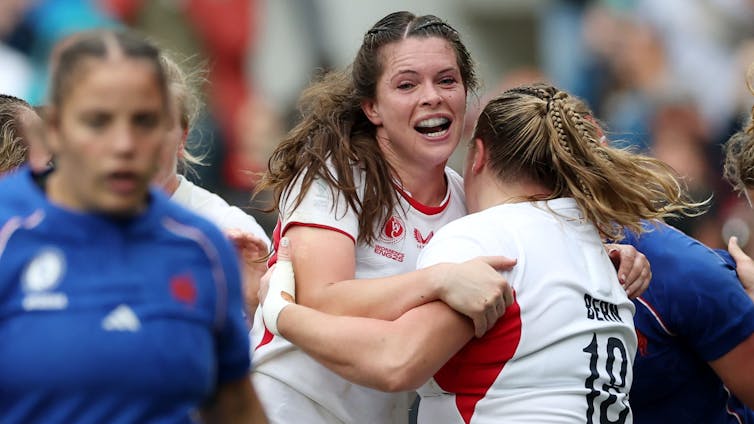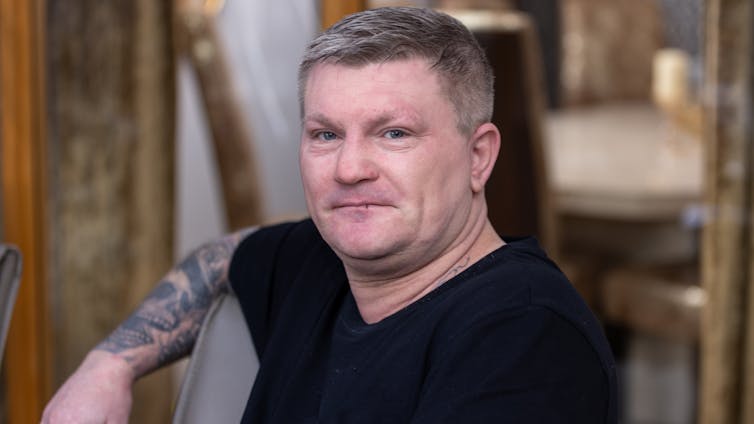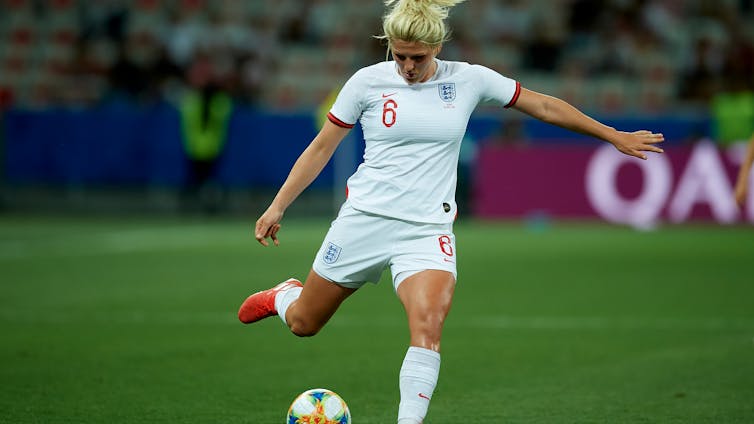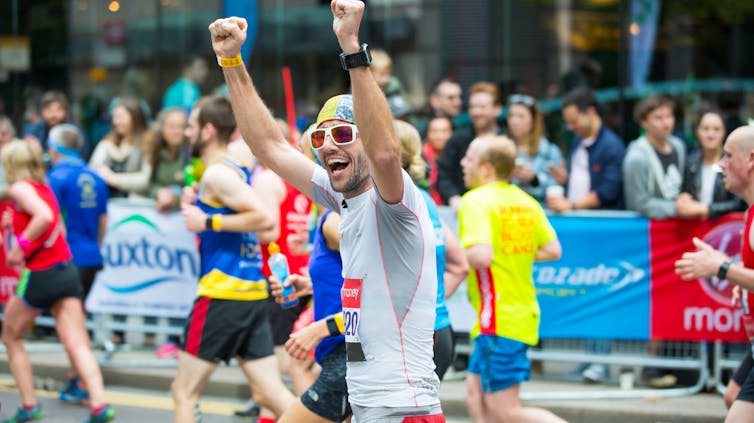By Kat Allott
I’m Kat, a lecturer in Sports Biomechanics within the Sport and Fitness team at The Open University, and I am also an internationally competitive Double Mini Trampoline (aka DMT) gymnast. It was trampolining that sparked my initial interest in biomechanics and how humans generate and control movement.
Trampolining was first introduced into the Olympic programme in Sydney, 2000, and with GB’s Bryony Page jumping to trampolining gold at the Paris 2024 Olympic Games, the sport’s profile has continued to rise in the UK. My passion, however, lies in DMT, a lesser-known trampoline discipline.
DMT is showcased at the World Games: an international multisport event often described as ‘the Olympics for non-Olympic sports’, where the top gymnasts in the world compete head-to-head for the World Games title. As well as exploring the sport of DMT, this blog focuses on what biomechanics is and how it can be used to understand technique, improve performance and reduce injury risk.
What is Double Mini Trampoline?
Although not part of the Olympics (yet!), DMT is a thrilling sport which involves sprinting down a 20 m runway and launching into powerful acrobatic skills… before landing as neatly as possible! As the name suggests, double mini trampolines are smaller than regular trampolines, but don’t be fooled: DMT favours gymnasts who can perform big, powerful skills. There are two points of contact with the DMT: an angled section and a flat section, where a gymnast links together two somersault skills before landing on a mat: the combined sequence of skills is called a ‘pass’. Here’s a video of me performing a pass at the 2025 British Championships:
How is a DMT pass scored?
Gymnasts are scored on three elements:
- The difficulty of the two somersault skills – how complex are the skills?
- Execution – how well do they perform the skills?
- Landing – did they stick with both feet in the red box?
The DMT is just 92 cm wide, so accuracy in landing on the trampoline each time to perform the two skills is key to success. As gymnasts progress in the sport, they can learn to flip with multiple somersaults and twists. For coaches and gymnasts, a key focus is the take-off for each skill, as this essentially determines all three of the scoring elements. Applying biomechanics can support coaches in helping athletes to develop their proficiency in their take-offs and consequently their performance of somersault skills.
What is biomechanics and how can it benefit DMT performance?
Human biomechanics applies the laws of physics to understand how and why people move the way they do. Sports biomechanics is the study of athletic movements to identify how to optimise performance and reduce the risk of injury.
Typically, biomechanists break down movements into phases to understand how each part contributes to the overall performance. DMT can be split into the run up, take-off, flight phase, and landing. As previously mentioned, the take-off for each skill is important. This is because jumping as high as possible gives the gymnast more time to complete a skill before they have to land. To achieve a good take-off, a gymnast runs quickly before jumping onto the DMT, which helps them to push down hard into the trampoline bed (in biomechanics we call this an applied force). Applying more force into the trampoline bed depresses the springs further and causes them to recoil more and push the gymnast higher into the air (this is literally the trampoline effect!), which maximises their vertical velocity (how quickly they are moving upwards) and their ability to start somersaulting (in biomechanics we call this angular momentum). In short, the more force a gymnast can apply to the trampoline, the higher they can bounce and the faster they can spin.
Why is the take-off so important?
Once the take-off has been completed and the gymnast is in the air, their angular momentum cannot change because there are no external forces pushing on them. If a gymnast takes off for a somersault in a straight body position but doesn’t achieve enough height at the correct angle on take-off, they could under-rotate their somersault: this increases the risk of not landing the skill upright and on their feet. In this situation, there is an escape route to avoid crash landing, and some biomechanical principles can help the gymnast here! By bending at their hips and knees – i.e. curling up into a tuck shape, they can speed up their spin, allowing them to safely land on their feet. So, whilst their angular momentum cannot change in the air, they can manipulate their body shape to become smaller and speed up their rotation in the air (in biomechanics we call this component of angular momentum the moment of inertia, which is the amount of resistance to change in rotation).
Performing a skill in a tucked (compared to a piked or straight) position receives a lower difficulty score from the judges, but if the take-off is compromised, and the gymnast has a choice between landing on their face or their feet, a tucked position may be the safer option! Even though they may not necessarily understand the biomechanical principles behind why they do it, experienced gymnasts will tend to intuitively change their shape, demonstrating a real-world application of biomechanics to support performance. Of course, compromising the take-off is not the only reason for changing shape in the air: gymnasts choose to perform somersaults and twists in different shapes which makes for exciting and varied routines to watch!
Twisting and landing safely
Biomechanics can also unlock insight into how best to perform somersaults with twists. It is possible to generate twist from the trampoline bed, but this action is likely to cause the gymnast to travel sideways. Remember, the trampoline bed is only 92 cm wide so any sideways movement may result in injury (I speak from personal experience…). The main method of twisting during straight somersaults is to tilt the body by producing asymmetrical arm movements before bringing them in close to the body. The gymnast can then reverse the arm movement to stop their twist and prepare for a controlled landing. During piked and tucked somersaults, gymnasts can twist by moving their hips to one side as they extend their legs [1].
There are various measures to ensure the safety of gymnasts during training when learning these complex skills: this includes landing on mats of different thicknesses to absorb impact, performing skills into foam pits, or using a harness: the harness allows coaches to control the movement of the gymnast to ensure their safety. Strength and conditioning is also vital so gymnasts can cope with the repetitive forces they experience during training and competition: trampolining can involve accelerations of around 6 G. Compare that to the 5 G forces that F1 drivers can experience [2], and you can start to see why strength and conditioning is important!
Of course, mastering the take-off, performance, and landing of complex somersaulting skills takes years of practice. Biomechanists have many tools that can help with understanding the aspects of technique that will improve performance, as well as reduce the risk of injury. Even the DMT itself has biomechanics applied to its design and development to ensure the right balance of safety and performance.
Biomechanics can show how a seemingly easy performance may in fact be comprised of complex components of technique, helping us to appreciate just how impressive the performances of these skills are!
Feeling inspired?
Double Mini Trampoline is a captivating world of somersaults and twists that combines speed, power, and control, all of which are underpinned by biomechanical principles. A good understanding of biomechanics can allow coaches to help gymnasts maximise their performance and reduce injury risk by:
- Learning skills consistently and with the correct technique
- Building the necessary strength to meet the demands of the sport
Feeling inspired to jump into the world of biomechanics? To find out more about biomechanics visit: https://www.cases.org.uk/spage-divisions-biomechanics_and_motor_behaviour.html and to find out more about getting involved in Double Mini Trampoline (participating clubs, available courses, and more) visit: https://www.british-gymnastics.org/.
References
[1] Yeadon, F. (2000). The physics of twisting somersaults. Physics World, 13, 33-37.
[2] G-Force and Formula One: Explained – Mercedes-AMG PETRONAS F1 Team.















